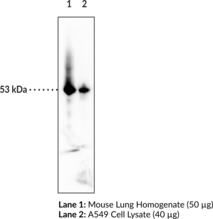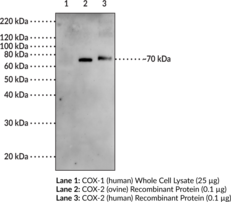Description
Epitope: Binds to N-terminal amino acids 16-25 of wild-type and mutant p53 Cellular p53, often called the ‘guardian of the genome,’ is a transcription factor that is activated in response to cellular stress (DNA damage, hypoxia, heat shock, etc.) and acts to prevent further proliferation of the stressed cell by induction of cell cycle arrest or apoptotic mediators.{8237} Nearly 50% of human tumors have mutated or non-functional p53. This antibody is suitable for a variety of techniques to distinguish between p53 positive and p53 negative tumors.{11929} This antibody binds the N-terminal (amino acids 16-25) of wild-type and mutant p53. This antibody does not work with frozen tissue sections. Cayman’s p53 Monoclonal Antibody (Clone BP53-12) can be used for flow cytometry, immunohistochemistry, immunoprecipitation, and Western blot applications. The antibody recognizes p53 at 53 kDa from human and mouse samples.
Synonyms: Antigen NY-CO-13|Cellular tumor antigen p53|Phosphoprotein p53|Tumor supressor p53
Immunogen: Recombinant human wild-type p53
Formulation: 100 µg of protein A-purified IgG2a
Isotype: IgG2a
Applications: FC, IHC (paraffin-embedded tissue), IP, and WB; this antibody does not work with frozen tissue sections
Origin: Animal/Mouse
Stability: 365 days
Application|Flow Cytometry||Application|Immunohistochemistry||Application|Immunoprecipitation||Application|Western Blot||Product Type|Antibodies|Monoclonal Antibodies||Research Area|Cancer|Cell Signaling|p53 Signaling||Research Area|Cancer|Transcription Factors|p53



